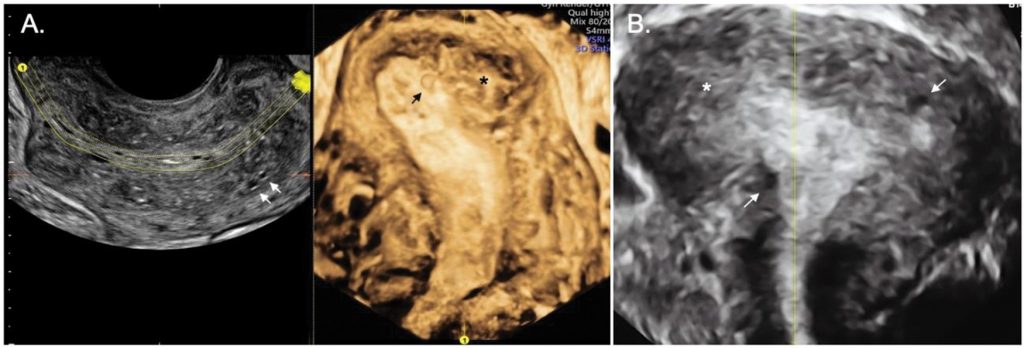Clinics (Sao Paulo). 2021;76:e2981.
Association of 2D and 3D transvaginal ultrasound findings with adenomyosis in symptomatic women of reproductive age: a prospective study
DOI: 10.6061/clinics/2021/e2981
OBJECTIVE:
To evaluate the association of two-dimensional (2D) and three-dimensional (3D) transvaginal ultrasound (TVUS) findings with adenomyosis symptoms.
METHODS:
This prospective study conducted between January and December 2018 enrolled 78 women aged 18 to 40 years with abnormal uterine bleeding (AUB), infertility, and/or pelvic pain. All patients underwent 2D and 3D TVUS. Signs of adenomyosis on TVUS were identified according to the consensus of the Morphological Uterus Sonographic Assessment group.
RESULTS:
The prevalence of adenomyosis on TVUS was 55.12%. Patients with adenomyosis were older (p=0.002) and had more dysmenorrhea, AUB, and endometriosis than those without adenomyosis. When comparing the presence of symptoms with each adenomyosis feature, on 2D TVUS, severe dyspareunia was significantly associated with the presence of a poorly defined junctional zone (JZ) (p=0.023) and on 3D TVUS, patients with AUB had a more irregular (p=0.003), poorly defined (p=0.028), and interrupted JZ (p=0.011). After logistic regression analysis, signs of adenomyosis on TVUS remained significantly associated only with age over 30 years (OR: 1.2; 95% CI: 1.0-1.2) and AUB (OR: 7.65; 95% CI: 2-29). Patients with diffuse adenomyosis were older and presented with more infertility and AUB than patients with focal or no adenomyosis.
CONCLUSION:
The findings of adenomyosis by 2D and 3D TVUS showed association with age and AUB. 3D TVUS alterations in the JZ were associated with AUB and dyspareunia. Diffuse adenomyosis was associated with older age, a greater prevalence of infertility, and AUB.
17


